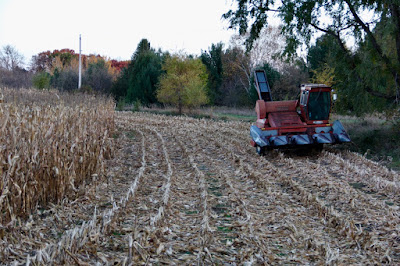 |
| our county has many small farms, mostly row crop
Photo by J. Harrington
|
Another point of concern is related to the resistance of many farmers to follow any conservation practice unless someone pays them to do so. Minnesota is engaged in a continuing "conversation" regarding implementing stream side buffers to help improve water quality in ag country. Although we're hard pressed to figure out how "family farms" don't bankrupt families, farm consolidation is another threat that diminishes rural resilience. More changes than those listed are needed.
[UPDATE via MinnPost: Exploring connections: food, farming and climate change]
October is the month of "pumpkin patches"
Photo by J. Harrington
AGRICULTURE AND LAND MANAGEMENTNumbers are Optimum Scenario Ranking (from Drawdown)
3 . Silvopasture — Adding trees to pastures to increase productivity
We've considered, time and again, raising sheep and/or goats. So far we've always come to our senses before any major damage was done. We have potential but not actual pasture, so this isn't applicable. Also, see intercropping, below.
5 . Tropical staple trees — Growing trees and other perennial crops for staple protein, fats, and starch
Minnesota is unlikely, even with global warming, to be an appropriate locale for tropical trees. Not applicable.
7 . Tree intercropping — Growing trees together with annual crops in a given area at the same time
We've tried, repeatedly, to start a small orchard. Pocket gophers avoided our traps and ate the roots of every tree we've planted, except one pear tree.
8 . Regenerative agriculture — Adopting at least four of the following six agricultural practices: compost application, cover crops, crop rotation, green manures, no-till or reduced tillage, and/or organic production
If we ever master the art of composting, we might qualify for one of these practices. Again, our small property isn't a farm.
9 . Farmland restoration — Restoring degraded, abandoned farmland to grow crops or native vegetation
We need to give this more consideration. Our property is an outlot of an old 40 acre farm. We're pulling buckthorn and working on replacing it with native plants.
10 . Managed grazing — Adjusting stocking rates, timing, and intensity of grazing in grassland soils
See response to Silvopasture above.
12 . System of rice intensification and improved rice cultivation — Adopting low-methane rice production methods for small or large operations
This is wild rice country, not rice country. Not applicable.
19 . Conservation agriculture — Adopting crop rotation, cover crops, and reduced tillage practices on agricultural land
Our property is not a farm.
28 . Nutrient management — Reducing the use of fertilizer use on farmland
Our property is not a farm.
29 . Farmland irrigation — Installing water and energy saving irrigation systems, such as drip irrigation
Our property is not a farm.
The Farm
My father’s farm is an apple blossomer.He keeps his hills in dandelion carpetand weaves a lane of lilacs between the roseand the jack-in-the-pulpits.His sleek cows ripple in the pastures.The dog and purple iriskeep watch at the garden’s end.His farm is rolling thunder,a lightning bolt on the horizon.His crops suck rain from the skyand swallow the smoldering sun.His fields are oceans of heat,where waves of goldbeat the burning shore.A red foxpauses under the birch trees,a shadow is in the river’s bend.When the hawk circles the land,my father’s grainfields whirl beneath it.Owls gather together to sing in his woods,and the deer run his golden meadow.My father’s farm is an icicle,a hillside of white powder.He parts the snowy sea,and smooths away the valleys.He cultivates his rows of starlightand drags the crescent moonthrough dark unfurrowed fields.
********************************************
Thanks for visiting. Come again when you can.
Please be kind to each other while you can.

No comments:
Post a Comment